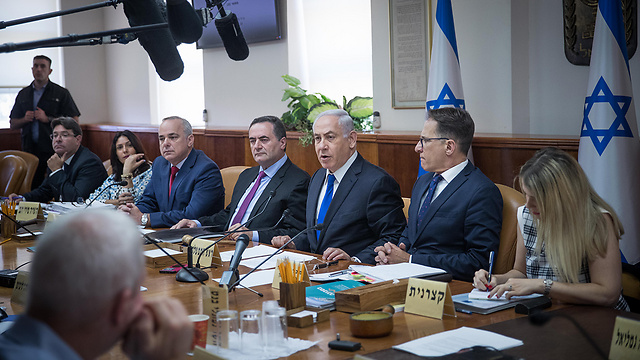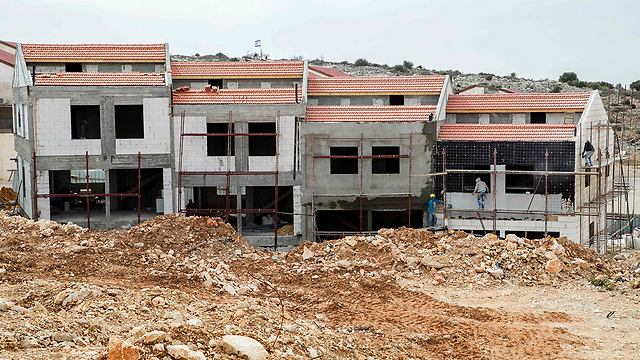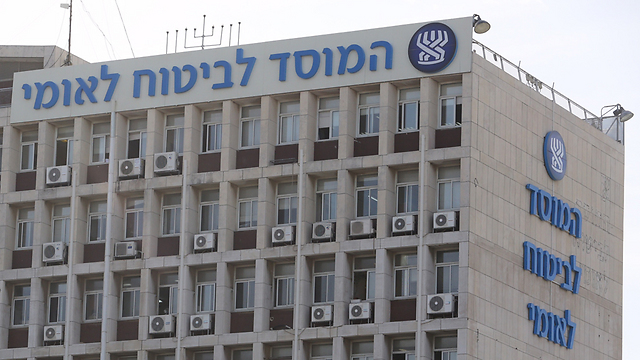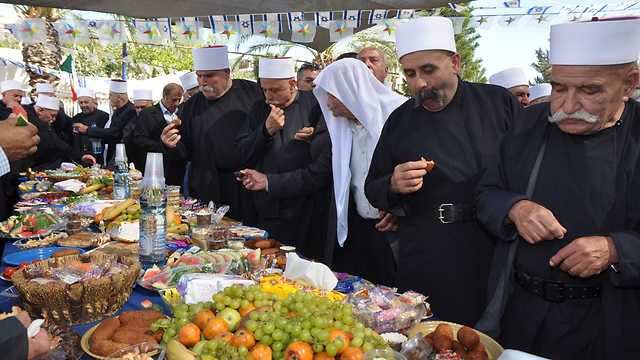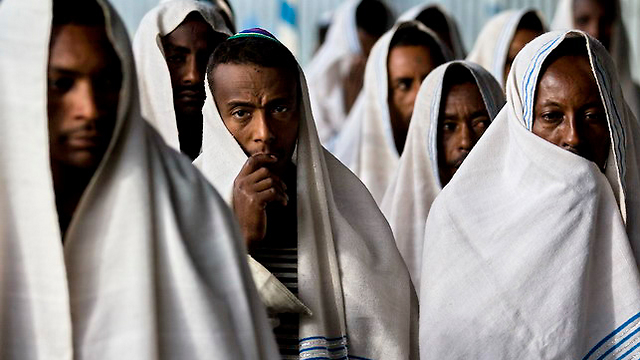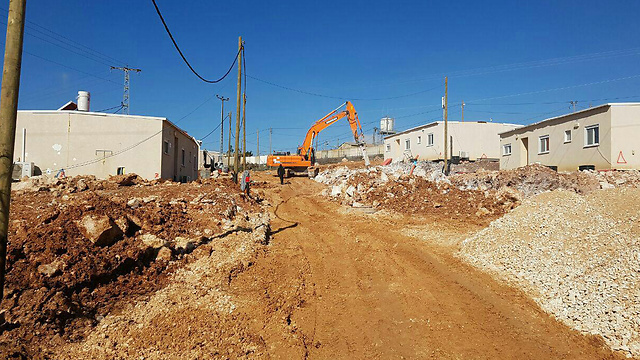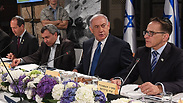

Report reveals which government decisions haven't been implemented
A status report on decisions due to be implemented by the end of 2016 shows 70% have been carried out, but others meant to reduce housing prices, resolve the National Insurance crisis and develop the periphery have yet to get off the ground.
The report examined 195 government decisions made up of 1,052 items, presenting a status report from government ministries and the relevant units on each of the items.
A similar report was published a year ago, but it lacked any detail on individual decisions. The new report details the execution—or lack thereof—of each specific decision or item, with the "excuses" of the relevant body presented in cases the decision hasn't been carried out in full.
Housing
A series of decisions have been made over the past two years in an effort to lower housing prices, mostly by increasing the supply of apartments in the market. Many of the decisions were carried out, but some remain stuck, delaying the promised drop in prices.
Primarily, the Housing Cabinet has yet to discuss and vote on a strategic plan for the housing field in the next 25 years.
To accelerate the rate of construction, it was determined Israel needed to encourage foreign construction companies to take on building projects in the country. However, despite the decision on the matter, the permits needed to hire up to 1,000 foreign workers have not yet been issued, and a plan to address safety concerns has not been formulated.
Another way the government determined to resolve the housing crisis, which also has advantages in the diplomatic area, is by increasing the quota of work permits for Palestinian and introducing professional training for Palestinian workers employed in the construction field in Israel. But this decision has not been implemented yet either, possibly due to security concerns.
Finally, the government determined steps must be taken to increase the number of Israeli workers in the field, but no moves have been made to encourage this.
Welfare and health
The current government spent a lot of time dealing with the aging of the population and the ramifications this will have on the pension and National Insurance coffers in the coming decades.
Despite having dedicated much time to the issue, the government has yet to formulate a plan to address the deficit in the National Insurance Institute. In addition, the findings of an examination of Israel's entire pensions system in the coming 25 years have not yet been presented to the government, nor did the the Socio-Economic Cabinet discuss these findings.
The government determined that integrating the elderly into the work force is an effective way to deal with the problem, but there is still no plan in place for the employment of elderly citizens who have passed the retirement age.
Regarding the younger generation, the government decided to establish a program to prevent online violence and crime targeting children and teenagers, but the Finance Ministry has yet to allocate a budget to that end.
Another decision to examine the challenges faced by at-risk youth as well as children and from poor families has yet to be implemented.
The government determined the punishment and rehabilitation of prisoners in Israel must be streamlined, but an interministerial coordinator has not yet been appointed for the prevention and reduction of crimes committed by teenagers. A study meant to examine the efficacy of community courts has not been conducted, while a temporary order has yet to be issued to commute prison sentences up to nine months long to community service. Furthermore, projects to reduce repeat offenses among teens and youth have not been promoted.
In health, the Finance Ministry has yet to allocate NIS 300 million required to fund additional services in the 'health basket' for 2016, and there is not yet a plan submitted to implement a report by a public committee on compensating employees of the Atomic Energy Commission who have been diagnosed with cancer.
Aid for minorities, disadvantaged, special communities
The government approved an extensive plan for economic development in minority populations, most of which has already been implemented. However, a plan for informal education to Israeli Arabs has yet to get off the ground, while a team has not yet been established to cut through the red tape for the construction of classrooms in minority communities, and public transportation information has not been made accessible to Arabic speakers.
Another plan that was not implemented in full is one to develop and bolster Druze and Circassians communities. The Treasury has yet to allocate funds for the promoting of welfare activities; urban planning and development; construction, renovations and maintenance of religious buildings and cemeteries; bolstering municipality workers in these communities; energy efficiency; building family health clinics and setting up programs for health education; establishing a heritage center for the Druze community and a branch of the Yad Labanim organization for families of fallen soldiers.
Another goal the government set is integrating the ultra-Orthodox population into the work force. Despite a decision on the matter, no appeals have been made to government ministries who may be interested in taking in ultra-Orthodox employees, while government hospitals haven't received funding to take in new employees from among the ultra-Orthodox population.
Following protests by Ethiopian immigrants, recommendations were made on how to eradicate racism against them, including recruiting experts, professionals, actors, creators and others with relevant talents to the campaign, but the recommendations were never implemented. The Finance Ministry also failed to provide funds to integrating and training members of the Ethiopian community in sports.
In addition, despite a decision on the topic, the eligibility of candidates from communities in Gondar and Addis Ababa to immigrate to Israel has not yet been examined.
The government also determined there needs to be more variety in the representation of different communities, sectors and populations in Israel in government advertisements and campaigns, but an archive of photos including full representation of the Israeli population has not yet been put together.
Bolstering periphery communities
The government decided to establish a team to lead the implementation of a plan to increase the budget for education and welfare in disadvantaged municipalities at the expense of wealthy municipalities, but the matter hasn't been promoted by the municipality heads.
Some of the budgets to encourage tourism in the Negev and Galilee regions have not been allocated, and an economic-budgetary examination of establishing new communities in the Negev has not been carried out.
In the capital, the Economy Ministry failed to allocate NIS 30 million for a loan fund for small businesses; encouraging studies combining cinema, Judaism and tradition in Jerusalem; marketing incoming tourism; carrying out moves to bolster Jerusalem's status as an academic city; and promoting culture and tourism in the capital.
Despite the great investment the current government has made in the Jewish West Bank communities, some of the decisions pertaining to the area have been delayed as well. For example, the Finance Ministry has yet to allocate some NIS 250 million for the construction of national infrastructure and public buildings and for security grants to municipalities in the West Bank. Furthermore, not all funds have been allocated to replacing mobile structures with permanent structures and renovating public structures to bolster security and safety.
In addition, not all funds have been allocated to building fire stations in local authorities, opening mental care centers and providing social and communal treatment to teenagers suffering distress due to the security situation.
In Bedouin communities in the north, no budget has been allocated for the social and physical rehabilitation of old neighborhoods; development of tourism; renovation of religious buildings; campaigns to promote a healthy and active lifestyle; implementation of education programs; establishment of a pre-army prep school; establishment of a heritage center; and after school extracurricular activities.
Environment
The government set a goal to transition the Israeli economy to natural gas consumption, but the different orders and regulations on the topic have yet to be issued.
As part of the national plan to reduce greenhouse gas emissions and increase energy efficiency, a budget was supposed to be allocated for a grants program for investment in energy efficiency. In addition, a multi-annual plan for energy efficiency, reduction in greenhouse gas emissions and the production of electricity from renewable energy has yet to be submitted, nor was a plan to reduce electricity consumption. In addition, the Finance Ministry has yet to allocate a NIS 300 million budget for the issue.
On the national plan to reduce air pollution and reduce environmental hazards in the Haifa Bay area, a survey has yet to be conducted to examine the risk levels at the factories and facilities in the bay area dealing with hazardous materials and the transportation of such materials.
Diplomacy and policy
The government has decided to form a team to prevent duplicate position holders in Israel's diplomatic missions worldwide, but it has not been implemented yet due to "the sensitive nature of the issue and in light of instructions from the political echelon."
The government also determined that bolstering economic ties and cooperation with African natures was a main goal, but no budget has been allocated to aid Israeli companies interested in entering markets in Africa, to promote agreements between governments and to expand Israel's activity in the World Bank. In addition, three planned centers of excellence have yet to be built in Uganda, Ethiopia and Kenya.














